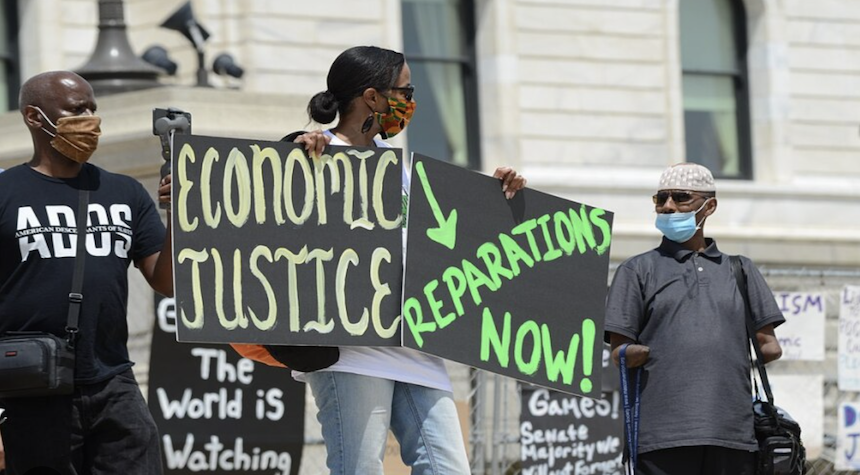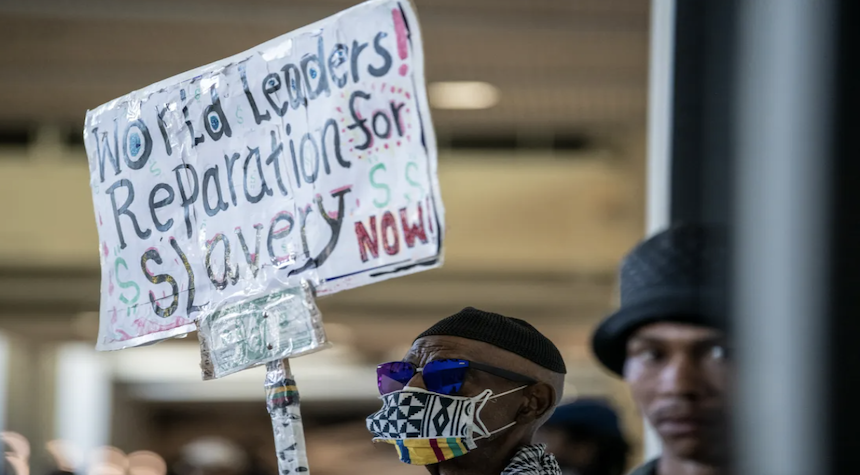Reuters published a 7,000-word novella as journalism a few days ago. The article I read reported that over 100 legislators, two Supreme Court Justices, and five presidents are descended from slave owners. It is as relevant from a policy perspective as if the same people were descended from horse thieves. Ironically, Donald Trump is currently the only US president who has no slave ownership links. From space, you could hear the gnashings of teeth directed at Reuters and The Lincoln Project.
California, not to be outdone by other states, launched a Reparations Task Force. The purpose of the task force was to get money from taxpayers that never owned slaves, via a state which was never a slavery state, for people who had never been enslaved.
The Task Force had suggested a preliminary number. A big number–800 billion dollars. The public’s reaction was not warm when the number was released. This payment would dwarf the budget of the state. Even Gavin Newsom balked at the idea of paying billions in “reparations” to the state.

It is a massive document that cost California $ 2.5 million. The report is 1,000 pages long, and most of it is a rehash of past wrongs that no one has ever committed. The report states:
160 years after slavery was abolished, its symbols and incidents are still embedded in the American political, legal, and financial systems, as well as the educational, cultural, and environmental systems. The racist, casteist, and false stereotypes that were created to support slavery are still harming African Americans physically and mentally today.
The report does not use words such as “felon” or “returning citizens”. There is also no definition of when a felon has stopped returning to the country and is returned in full.

These words, which reduce people to their criminal justice status and deny them their full personhood, reinforce a stigma that prevents them from participating fully in society.
The California Globe lists over 140 bullets that show, aside from the Task Force’s demand for money and a lot of nonsense, it is not a good thing. It included:
Abrogation of Proposition 209 Proposition 209 prohibits the state from giving racial preference. It amended the Constitution so that state institutions could not consider race, gender, or ethnicity when hiring. The Task Force seems to think that not taking race into consideration when hiring people is a bad idea.
Make legislative findings that reflect the historical and current state of pervasive structural barriers and discrimination against African Americans. Support reparative legislation.

Amend the California Constitution in order to prohibit Involuntary servitude. The Task Force does want to ban slavery.
Address and remedy discrimination against African American LGBT+ youth and adults, reduce economic disparities for the African American population, and reduce disparities in mental health and health care outcomes for African American LGBT+ youth and adults.
The Task Force has over 140 bullet points of demands. The Task Force is looking to illegally amend the Constitution. They also want to make a record in which the state apologizes constantly for slavery. They also want slavery abolished (apparently, they have never heard of the 13th Amendment).
The Task Force collectively raised its hands after the Task Force stated that they wanted $800 billion, and received immediate blowback. They said, “Stop focusing only on the money!” It’s more of a guideline rather than a demand. This reminded me:
When you consider how absurd this recommendation was, it’s hard to not want an explanation. This is more than twice the budget of the state. The Task Force then reduced the figure to $200 billion without explaining how or why it arrived at the lower figure. It was almost as if a shakedown went wrong, and the Task Force responded with “Okay, how about 200 billion?” “Will that work?”
Richard Weaver is the legal adviser to the California Globe.
It is a list of suggestions that is patronizing, sloppy, and offensive. They didn’t bother to spellcheck the document, which is full of typos and misspellings. They didn’t bother to spellcheck the most important thing they have ever done. They would have taken more care if they had cared about it.
Many of these Californian recommendations are currently being worked on. Their inclusion in this list is therefore meaningless. Some are illegal now, such as the repeal of Prop 209 which was made federal law Thursday. Others are decided by the voters, courts, or some other method. Some of them are repeated over and over, such as the abolishment of the death penalty.
I read the executive summaries. Weaver’s summary is accurate. Just the summary of the report contains spelling mistakes and clunky words. Just reading the summary was difficult enough. It was possible to fall asleep. You can read the whole report here.
Best of luck!


